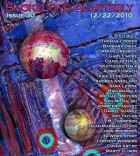In choosing your story for the issue, what drew me in was the voice, which felt a lot like an old exploitation flick. How did the voice come to you? Where did the story come from?
When my cousin got hired at a law firm, they took him and a bunch of other guys out to Bithlo, a very “country” place compared to the city of Orlando where I live. (Both my cousin and I were born in West Virginia, so folks like the ones in my story aren’t unimaginable.) Anyway, there’s a Crash-o-rama out in Bithlo. It’s essentially a demo derby with a figure-eight track that has school bus races and other moto carnage.
I’ve never been to Crash-o-rama or anything like it, but my cousin told me about when he went there how a good-old-boy announcer said almost verbatim the first section of my story to the stadium of people as José, a Hispanic man, was fire extinguished and then pulled from a flaming car. In that announcer’s voice was what I would call an endearing racism that many times is excused in the South (though I don’t really feel Orlando is in the “South”). His voice stuck with me.
While writing “Crash-o-rama!” my thoughts followed that people go to places like Crash-o-rama to see someone get hurt, and then survive; because if that person makes it, then we all can “make it,” too. I don’t think people want to surrender to death. But at the same time that we fight death (vicariously) we applaud death (or at least the spectacle of it), because if death isn’t hard to conquer then it’s not really a fight worth fighting/watching.
Can you remember the first really exciting experience you had with reading? The book or story that set you on your way?
In between 4th and 5th grade, my mom was reading The Hobbit by J.R.R. Tolkien out loud to my older brother and me during our hotel stays on a summer road trip. I thought she wasn’t getting through it fast enough so I took the novel and finished it on my own. It’s not the first book I read on my own, but it was the first time I took ownership of reading.
This fall I’ve been reading Best American Short Stories 2010, and in the intro Richard Russo remembers when I.B. Singer was asked the question, “What is the purpose of literature?” And Singer answered, “To entertain and to instruct.” I like that.
I actually have some trouble with flash/short-short pieces because many times they just don’t satisfy me. It doesn’t feel like the author is really putting his or her “all” into it. But with yours, it gave me the same experience as I would have reading a longer story. So how do you approach flash fiction? What does it take for you to feel satisfied when writing it?
The best stories I’ve read have been the ones where I escape into the rabbit hole of the story so far that I don’t realize I’m reading a story and by the end of it I would be content if it was last thing I’d ever read, because it’s so good. (Perhaps that feeling of transcendent empathy is necessary for a “good” story?) Anyway, with my own writing, I feel that the best pieces I’ve written do the same thing: I don’t feel like it’s a story so much as a reality and that I would be fine with that having been the last thing I’d written.
I believe that flash fiction has to focus on a strong enough compressed moment so that everything around that moment is filled in by the reader’s mind. In “Crash-o-rama!” there’s no “before” the wreck (even though the reader knows how it happened) and there’s no “after” the wreck (even though everyone, even the reader, will have consequences to deal with for being a witness).
I usually use an image to set up a trajectory for a reader at the end of my flash fiction. However in “Crash-o-rama!” the end is a little more moralistic. To me section six is more of an epilogue, and it’s a direct address, almost a 4th wall break, where the witnesses (including the reader) are in some way responsible for the wreck. But I don’t want to condemn them (because everyone looks at a car wreak), so I try to send everyone forth with the hope that maybe we can all “make it.”
Imagine someone puts a gun to your head and says “Tell me why you write. You’ve got ten words to do it in. One of those words can’t be ‘need’. Go.”
Don’t shoot! I am captivated with my struggle to write.
What’s the worst thing anyone’s ever said about something you wrote?
In the fall of 2006, the first writing instructor I ever had, and wrote “25 Miles to Athens” in her class, wrote Nothing’s really revealed to push the story forward on the first page! I don’t think that that’s the worst thing, but it’s the thing that I thought of.
With that, I don’t believe writers are supposed to have thick skin (because how could you absorb necessary criticism?), but that we’re supposed to have resilient skin. If you take the help that’s given you, you can make something better, always.
CICADA magazine bought “25 Miles to Athens” as my first published fiction in Winter 2009.
So, what is the most interesting thing in the whole world to you right now at this moment? Gonna write about it?
[Note: Overall, I write more nonfiction than fiction; and if it’s fiction then it’s based in some sort of aspect of nonfiction.]
The most interesting thing in the whole world right now is actually a person: this girl I’m seeing. It’s been on and off, and now on again with us. I have already written about it though.
Another thing I’m really interested in is this story about the 200 out of 600 students who were in a 4000-level business class this fall 2010 at the University of Central Florida (my alma mater) and admitted to cheating on a test. I am definitely exploring this and am interested to see what I will discover.
Read further questions and follow-up answers on Chris Wiewiora’s blog, here.



 The core workshop of SmokeLong Fitness is all in writing, so you can take part from anywhere at anytime. We are excited about creating a supportive, consistent and structured environment for flash writers to work on their craft in a community. We are thrilled and proud to say that our workshop participants have won, placed, or been listed in every major flash competition. Community works.
The core workshop of SmokeLong Fitness is all in writing, so you can take part from anywhere at anytime. We are excited about creating a supportive, consistent and structured environment for flash writers to work on their craft in a community. We are thrilled and proud to say that our workshop participants have won, placed, or been listed in every major flash competition. Community works.